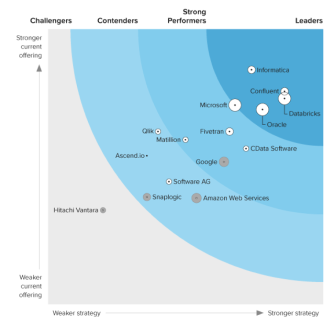Discover how a bimodal integration strategy can address the major data management challenges facing your organization today.
Get the Report →Replicate BigCommerce Data to Multiple Databases
Replicate BigCommerce data to disparate databases with a single configuration.
Always-on applications rely on automatic failover capabilities and real-time access to data. CData Sync for BigCommerce integrates live BigCommerce data into your mirrored databases, always-on cloud databases, and other databases such as your reporting server: Automatically synchronize with remote BigCommerce data from Windows or any machine running Java.
You can use Sync's command-line interface (CLI) to easily control almost all aspects of the replication. You can use the CLI to replicate BigCommerce data to one or many databases without any need to change your configuration.
Connect to BigCommerce Data
You can save connection strings and other settings like email notifications in XML configuration files.
The following example shows how to replicate to SQLite.
Windows
<?xml version="1.0" encoding="UTF-8" ?>
<CDataSync><DatabaseType>SQLite</DatabaseType>
<DatabaseProvider>System.Data.SQLite</DatabaseProvider>
<ConnectionString>OAuthClientId=YourClientId; OAuthClientSecret=YourClientSecret; StoreId='YourStoreID'; CallbackURL='http://localhost:33333'</ConnectionString>
<ReplicateAll>False</ReplicateAll>
<NotificationUserName></NotificationUserName>
<DatabaseConnectionString>Data Source=C:\my.db</DatabaseConnectionString>
<TaskSchedulerStartTime>09:51</TaskSchedulerStartTime>
<TaskSchedulerInterval>Never</TaskSchedulerInterval>
</CDataSync>
Java
<?xml version="1.0" encoding="UTF-8" ?>
<CDataSync><DatabaseType>SQLite</DatabaseType><DatabaseProvider>org.sqlite.JDBC</DatabaseProvider>
<ConnectionString>OAuthClientId=YourClientId; OAuthClientSecret=YourClientSecret; StoreId='YourStoreID'; CallbackURL='http://localhost:33333'</ConnectionString>
<ReplicateAll>False</ReplicateAll>
<NotificationUserName></NotificationUserName>
<DatabaseConnectionString>Data Source=C:\my.db</DatabaseConnectionString>
</CDataSync>
BigCommerce authentication is based on the standard OAuth flow. To authenticate, you must initially create an app via the Big Commerce developer platform where you can obtain an OAuthClientId, OAuthClientSecret, and CallbackURL. These three parameters will be set as connection properties to your driver.
Additionally, in order to connect to your BigCommerce Store, you will need your StoreId. To find your Store Id please follow these steps:
- Log in to your BigCommerce account.
- From the Home Page, select Advanced Settings > API Accounts.
- Click Create API Account.
- A text box named API Path will appear on your screen.
- Inside you can see a URL of the following structure: https://api.bigcommerce.com/stores/{Store Id}/v3.
- As demonstrated above, your Store Id will be between the 'stores/' and '/v3' path paramters.
- Once you have retrieved your Store Id you can either click Cancel or proceed in creating an API Account in case you do not have one already.
Configure Replication Queries
Sync enables you to control replication with standard SQL. The REPLICATE statement is a high-level command that caches and maintains a table in your database. You can define any SELECT query supported by the BigCommerce API. The statement below caches and incrementally updates a table of BigCommerce data:
REPLICATE Customers;
You can specify a file containing the replication queries. This enables you to use the same replication queries to replicate to several databases.
Run Sync
After you have configured the connection strings and replication queries, you can run Sync with the following command-line options:
Windows
BigCommerceSync.exe -g MySQLiteConfig.xml -f BigCommerceSync.sql
Java
java -Xbootclasspath/p:c:\sqlitejdbc.jar -jar BigCommerceSync.jar -g MySQLiteConfig.xml -f BigCommerceSync.sql







